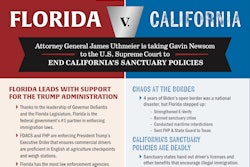California's State Transportation Agency has doubled down on a letter denying any wrongdoing with regard to English language proficiency enforcement for commercial truck drivers after DOT pulled $40 million in funding from the state.
DOT in August put California, Washington and New Mexico on notice that if the states did not present a plan to start enforcing ELP as an out-of-service violation within 30 days, they would risk losing federal funding.
Washington replied at length and instituted changes. New Mexico, too.
California alone defied DOT and to this day does not put drivers who can't communicate in English out-of-service.
A letter from California's STA delivered to DOT in September, which the STA says it still stands by, revealed the state's intentions with respect to ELP enforcement:
- The state believes it does comply with federal rules and that those rules don't mean it must place drivers OOS for ELP violations.
- California believes "there is no federal requirement that English language proficiency be established through 'roadside inspections.'"
- The state nonetheless told Overdrive this week that it expected to ultimately adopt the Commercial Vehicle Safety Alliance's OOS updates on its usual timeline, in Spring next year.
- The state will take the $40M loss in federal MCSAP funding as a result.
[Related: Six states issuing CDLs 'not consistent with federal regulations': What's going on]
The letter, dated September 25 (the DOT's original deadline for a response to its charges of a lack of ELP enforcement), presents California's rationale beginning with saying it "is fully compliant with Motor Carrier Safety Assistance Program requirements, applicable federal regulations, and California’s Commercial Vehicle Safety Plan approved by the Federal Motor Carrier Safety Administration earlier this year."

"California’s laws, regulations, standards, and orders are either identical to or have the same effect as the federal safety requirements -- including the English language proficiency requirement," the letter continues. "California properly enforces this requirement through its commercial driver’s licensure procedures."
The letter cites California Vehicle Code section 15250(a)(1) as saying a “person shall not be issued a commercial driver’s license until passing a knowledge test and driving test for the operation of a commercial motor vehicle that complies with the minimum federal standards." Those standards include the required driving test being conducted in English.
California does offer the CDL knowledge test in English and Spanish, but all CDL skills tests require English, and there's a good amount of speaking and instruction in a compliant CDL skills test.
[Related: CDL schools call out 'threat' of 'unscrupulous training entities']
The "entire commercial vehicle road test must be conducted in English," the state's transportation authority wrote. "California incorporates and enforces an English language proficiency requirement by incorporating it into its testing and licensure process."
Therefore, according to California, "this explicit incorporation of federal standards ... alone is sufficient" and compatible with federal standards. Furthermore, California's own state laws require a "test of the [CDL] applicant’s ability to read and understand simple English used in highway traffic and directional signs."
California disputes DOT, saying "there is no federal requirement that English language proficiency be established through 'roadside inspections.'" The English language requirement codified in 49 CFR 391.11(b)(2) "has not been amended to require roadside tests for English language proficiency", California wrote. "And the FMCSA’s guidelines on assessing English language proficiency do not obligate State Lead Agencies to conduct examinations or impose enforcement procedures during roadside inspections."
Instead, California said that the Federal Motor Carrier Safety Administration's May 20 memo updating enforcement procedures for ELP "is clearly directed to the Agency’s own employees and agents."
California is the only state that reads the memo and the rule this way, as DOT found all 49 other states in compliance and enforcing ELP as an OOS violation.
On DOT's charge that California has failed to give "full faith and credit" to other states' OOS orders for non-English speaking drivers, California echoed what the Commercial Vehicle Safety Alliance already told Overdrive: Inspectors don't have any easy way to tell if a driver has been put OOS.
"As FMCSA is surely aware, there is no existing process for state agencies to notify agencies in other states of out-of-service determinations," the letter said. "There is also a delay between when an out-of-service report is issued and when that information is available on federal databases for states to view. And once available, those reports do not flag English language proficiency violations for review during roadside stops."
The letter goes on to tout California's safety record with CDL drivers. "In 2023, the last year for which full data is available, California commercial driver’s license holders were involved in fatal crashes at a rate 39.4% lower than the national average," California said. "By comparison, Texas commercial driver’s license holders (the only state with more such license holders than California) were involved in fatal crashes at a rate almost 50% higher than California commercial license holders."
The letter said California will adopt the new OOS criteria, but only next year.
"[W]e anticipate that the latest version of the Commercial Vehicle Safety Alliance’s out-of-service criteria, including lack of English language proficiency as a basis for out-of-service status, will be incorporated in California regulations during the next annual review process," the letter said.
How did DOT respond to California? Not well. The $40 million penalty went ahead.
“I put states on notice this summer: enforce the Trump Administration’s English language requirements or the checks stop coming," Duffy said in a DOT release. "California is the only state in the nation that refuses to ensure big rig drivers can read our road signs and communicate with law enforcement. This is a fundamental safety issue that impacts you and your family on America’s roads."
Asked how California responded to DOT's recent statements about ELP enforcement and losing $40 million in funding, STA said the following:
"California remains committed to the safety of the traveling public and will continue to comply with applicable federal laws and regulations. We stand behind our September 25, 2025, response to the Federal Motor Carrier Safety Administration. We recently received USDOT’s October 15, 2025, notice and it is under review."











